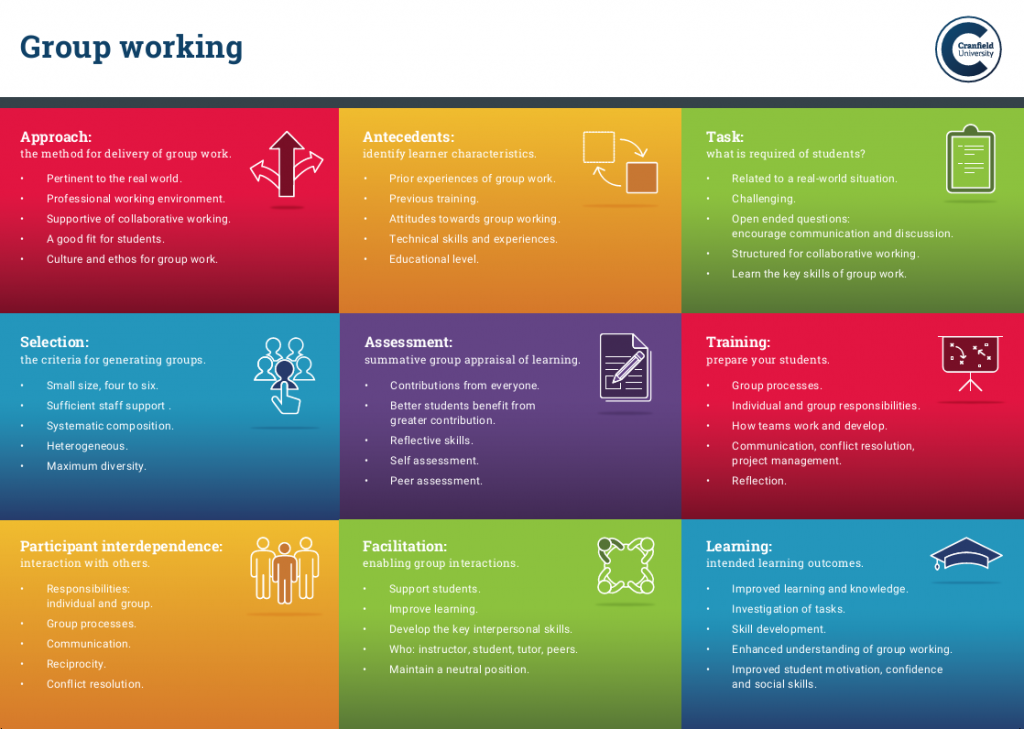
Peter Harrison
Cranfield University
19th February 2020
It is almost beyond question that the ability to work in groups or teams is a key skill which is required by employers and throughout our professional lives. However, the skills required for working effectively in teams are changing. Nowadays groupwork is tending to be less about sitting down face to face in a darkened room to thrash out ideas between a few colleagues, instead it is becoming a technologically enabled activity via message boards, video and audio conferences and semi-social media tools. These tools are mediating what happens by controlling visibility and contribution of all team participants as well as sometimes adding content. An example is the generation of content by a particular technological platform, such as posting links or suggesting further meetings based upon algorithms – think of what Facebook, Google or Amazon can do based upon your use of their digital platforms! In addition to this, these tools can affect our experience, accessibility and opportunity to participate in group activities and so understanding them and using them effectively is important for future career success.
The functional processes of working in groups are life skills initially learnt as part of school-based and social development activities and often based upon close peer and friendship groups. However, as outlined above, professional teamwork may not share these characteristics and so pose a new challenge for skills development in undergraduate programmes. Most degree programmes will contain an element of group working but my experience of reviewing student and faculty feedback over the years is that it remains one of the most commented aspects of the student experience, both positively and negatively.
At Cranfield University, group working is an integral and distinctive feature of our postgraduate taught programmes. The basic premise is a course structure of teaching – group design project – individual research project which has been constantly evolved and refined as a distinct principle in our aerospace programmes since the early 1950s. Although expressed differently according to context, this has been embedded across a number of postgraduate programmes in different types of group work, for example, whole courses working in groups to solve different parts of one problem, or teams competing to solve the same problem from different points of view (technical, production, business, marketing), or, teams in direct competition with each other and hence simulating commercial pressures. Group work is used in different ways across the Cranfield course portfolio; some tasks may happen over a short period whilst other courses may run the group design task in parallel with other activities such as taught blocks across an extended period of one term or more.

Whilst this philosophy of emphasising group work is intrinsic to Cranfield’s course design philosophy, it is not always an easy process for students, teachers or mentors to get right. To understand more about these challenges, The Centre for Andragogy and Academic Skills and Cranfield School of Management worked together to commission a research project to investigate a selection of approaches to group work across the university.
Our view had been that mid- career professionals and post-graduate learners would be comfortable and proficient in the group work situation owing to their past work experience, and that the focus of learning would be about the technical objectives and the application of knowledge alongside the practice of skills and higher order problem solving. Changes in the demographic of our students due to increasing internationalisation of cohorts, a net shift to lower average cohort age, changes in the amount and nature of their pre-experience and the increase in non-traditional pathways, such as degree apprenticeships, led us to re-examine our assumptions.
There has been substantial previous research into collaborative and group working in both undergraduate and employment contexts. These are mainly where the participants are inexperienced in such environments and/or have little professional experience. Reviewing this research base led us to classifying the challenges into nine themes that were identified in the published literature. To these themes we allocated a number of descriptors; some were characteristics or attributes while others were questions or prompts.

Figure 1: Challenges and themes in group work (CAAS, Cranfield University)
The initial study looked specifically at three areas in more detail, which were Team Selection, Group Assessment (particularly summative) and Groupworking Training.
On team working skills
Our research challenged the assumption that our learners would be experienced and comfortable working in groups. The learners had a clear desire for skills training alongside support and coaching.
There was a perceived problem in rapidly forming effective groups. The most common way groupwork was used was in short duration tasks (1-4 weeks) where the rapid setup and breakdown necessitated by our teaching pattern was predicated as replicating professional task and finish teams.
On team selection and support
Although the studied groups had a range of approaches to team selection from wholly self-directed to pre-determined, the research recommended that group members should be actively selected to become effective teams.
On team-based assessment and student experience
In most cases significant groupwork tasks were related to summative assessment – marks that directly affected the final degree result. The high stakes probably under-pinned many negative reflections such as “contributing little”, “they got marks for my work”, “not team players” (+ive and –ive) and perceptions about fairness of assessment.
A number of specific recommendations arose from the research project carried out at Cranfield which will be taken forward in MK:U course design:
Our experience and research at Cranfield University should be considered when designing education programmes for the new MK:U. Already, the MK:U curriculum is being actively designed with collaborative working at the student-student level as well as student-faculty level but key to success will be student – faculty – workplace collaboration to solve real world problems. Hence, the way in which professional skills and behaviours are intrinsically embedded into the curriculum will be essential to student success in efficient groupwork activities.
Peter Harrison, Head of Andragogy and Academic Skills at Cranfield University, is working with colleagues from Cranfield and Aston Universities within the Centre for Innovation in Learning and Education (CILE). The joint virtual centre aims to develop new knowledge in innovative education, business-engaged educational design and innovative delivery modes in undergraduate provision within UK Higher Education. Through joint research, the sharing of best practice and the design of innovative education pathways, Aston and Cranfield Universities are supporting the proposed development of a new model STEM-focused university in Milton Keynes.
This blog has been produced for the Centre for Innovation and Learning in Education, a Catalyst OfS funded project.
Chivers, J. (2017). What aspects of group work influence learner experience at Cranfield University? (Cranfield University). Retrieved from https://dspace.lib.cranfield.ac.uk/bitstream/handle/1826/13349/Chivers_J_2017.pdf